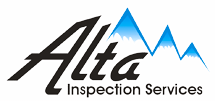FAQs
The following list contains questions that people frequently ask Alta Inspection Services, Inc.

If you have a question or concern that is not on the list, or would like further information than what we have given below, please feel free to Contact Us and we will get back to you as soon as we can.
- What is a Home Inspection?
- What does a typical Home Inspection cover?
- What does an Inspector's Report include?
- What will it cost?
- Should I attend the Home Inspection?
- Are you licensed?
- Does a Home Inspection cover building codes?
- I am purchasing new construction. Do I need a Home Inspection?
- Why can't I do it myself?
- Can a house fail a Home Inspection?
-
How do I schedule an Inspection?
1. What is a Home Inspection?
A home inspection is an objective visual examination of the physical structure and systems of a home, from the roof to the foundation. Having a home inspected is like giving it a physical check-up. If problems or symptoms are found, the inspector may recommend further evaluation.
A home inspection is a non-invasive examination of the condition of a home, often in connection with the sale of that home. This is carried out by a home inspector, who usually has special equipment and training to carry out such inspections. A home inspection report is then issued by the home inspector.
2. What does a typical Home Inspection Cover?
A typical home inspection covers the main elements in a home including the roof, siding, exterior grading and drainage, gutters and downspouts, the mechanical systems such as heating and cooling equipment. It covers the electrical and plumbing systems, plumbing fixtures, windows and doors, appliances, structural elements, insulation and ventilation in the attic. When ever possible the Home Inspector will walk on the roof, enter the crawl space and enter the attic to get a good look at things. Home Inspectors use specialized equipment to help identify problems and assess the performance of equipment, such as gas detectors, moisture meters and thermometers.
3. What does an Inspector's Report include?
The standard home inspector's report will review the condition of the home's heating system, central air conditioning system (temperature permitting), interior plumbing and electrical systems; the roof, attic, and visible insulation; walls, ceilings, floors, windows and doors; the foundation, basement, and visible structure.
4. What will it cost?
The inspection fee for a typical one-family house varies geographically, as does the cost of housing. Similarly, within a given area, the inspection fee may vary depending on a number of factors such as the size of the house, its age and possible optional services such as septic, well or radon testing.
Do not let cost be a factor in deciding whether or not to have a home inspection or in the selection of your home inspector. The sense of security and knowledge gained from an inspection is well worth the cost, and the lowest-priced inspection is not necessarily a bargain. Use the inspector’s qualifications, including experience, training, compliance with your state’s regulations, if any, and professional affiliations as a guide
5. Should I attend the Home Inspection?
Yes, if possible. It is very valuable for the buyer to walk through the home with the Home Inspector. This allows the prospective buyer to see things first hand, get a good understanding of how things work and get a feel of the condition of the home.
6. Are you licensed?
Yes. All Alta Inspection Services inspectors are licensed with the State of Illinois Department of Banks and Real Estate (IOBRE). Additionally, we are licensed by the State of Illinois Emergency Management Agency (IEMA) to conduct Radon testing.
7. Does a Home Inspection cover building codes?
Typically not. A home inspection is not a code inspection. Building codes vary from town to town. We will, however, point out code violations that are a health or safety risk, such as improper electrical wiring or improper plumbing practices.
8. I am purchasing new construction. Do I need a Home Inspection?
Absolutely. Even the best builder has to oversee hundreds of sub-contractors working together and against each other. We find numerous problems and omissions in new construction inspections.
9. Why can't I do it myself?
Even the most experienced homeowner lacks the knowledge and expertise of a professional home inspector. An inspector is familiar with the elements of home construction, proper installation, maintenance and home safety. He or she knows how the home’s systems and components are intended to function together, as well as why they fail.
Above all, most buyers find it difficult to remain completely objective and unemotional about the house they really want, and this may have an effect on their judgment. For accurate information, it is best to obtain an impartial, third-party opinion by a professional in the field of home inspection.
10. Can a house fail a home inspection?
No. A professional home inspection is an examination of the current condition of a house. It is not an appraisal, which determines market value. It is not a municipal inspection, which verifies local code compliance. A home inspector, therefore, will not pass or fail a house, but rather describe its physical condition and indicate what components and systems may need major repair or replacement.
11. How do I schedule an Inspection?
To schedule an Inspection follow one of the following links:
